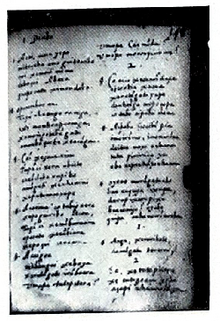| In the Village of Guaraparim | |
|---|---|
 | |
| Written by | Joseph of Anchieta |
| Characters |
|
| Date premiered | Possibly 1585 |
| Place premiered | Guaraparim village, Espírito Santo |
| Original language | Tupi |
| Series | |
In the Village of Guaraparim[4] (Portuguese: Na Aldeia de Guaraparim) is the title given to the longest play by Joseph of Anchieta, canonized in 2014,[5] written exclusively in the Tupi language, a now dead language.[6][note 1]
First performed in the Brazilian state of Espírito Santo, perhaps in the year 1585, it portrays a group of devils plotting to take over a village. When the soul of an Indian named Pirataraca enters the scene, the devils try to tempt him. However, Pirataraca defends himself, calling upon the forgiveness of God. A guardian angel intervenes, protecting the village and expelling the devils.
The purpose of the play was to evangelize the indigenous people and colonists in a playful manner,[8] and furthermore attacks on the cultural elements of the Brazilian indigenous people can be observed. The play has ethnographic and linguistic significance.
- ^ Anchieta 1954, p. 280.
- ^ Anchieta 2006, p. 128.
- ^ Anchieta 1954, p. 604.
- ^ Cite error: The named reference
Encyclopedia Britannicawas invoked but never defined (see the help page). - ^ Anchieta 2006, p. XIII.
- ^ Lima & Silva 2021, p. 23.
Cite error: There are <ref group=note> tags on this page, but the references will not show without a {{reflist|group=note}} template (see the help page).